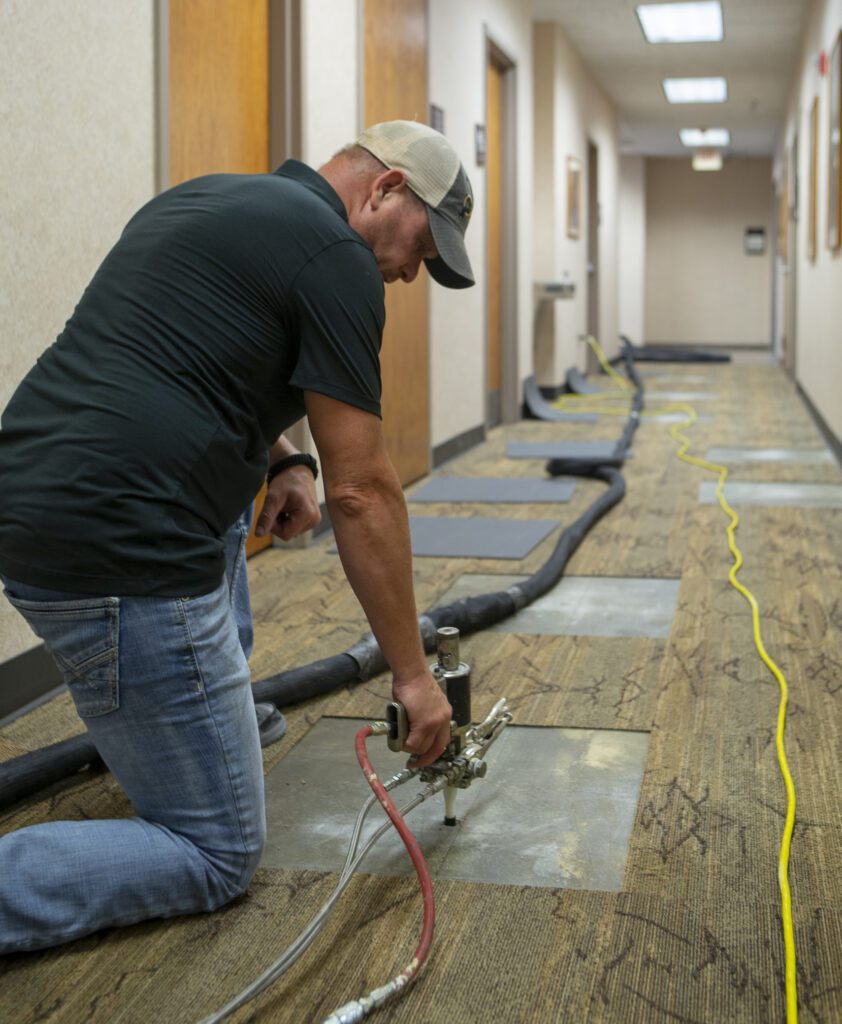What is
Polyjacking?
Polyjacking is an alternative concrete leveling solution that injects a polyurethane foam under a concrete slab. The polyurethane is forced into pre-drilled holes using an injection gun connected to a pump. As the foam expands underneath the slab it fills the empty voids, stabilizing the soil and permanently lifting the concrete.
Polyurethane works because of a unique chemical reaction. When released from the injection gun, it expands within seconds, compressing loose soil and raising the concrete - both the soil and concrete are stabilized, preventing the concrete from fracturing, sinking or failing. The toughness and resilience of polyurethane foam means there are no redos, no mistakes, and a lifetime guarantee.


The Polyjacking Process
Initial Assessment
We’ll come out to inspect your concrete, discuss the issues you’re facing, share what needs to be done, and provide a free complimentary quote for the job at hand.
Creating the Injection Site
Once it’s time to repair your concrete, we will drill a small, dime-sized hole into the affected area to create the polyurethane injection site.
Polyurethane Injection
We precisely inject the required amount of polyurethane foam under your damaged concrete. As the polyurethane expands, it levels your concrete, fills in any gaps, and stabilizes the soil underneath from future settling. We’ll patch the injection site to finish the process.
"WHAT ABOUT MUDJACKING?"
Mudjacking: A Familiar Solution with Familiar Problems
Mudjacking is a method of concrete leveling that pumps mud under a driveway, property, or other sunken concrete to elevate it. Mudjackers will use a specialized mud mix and use a hydraulic pump to push the mud mix into holes drilled in the slabs.
While mudjacking is widely available, it is now considered a more primitive method for concrete leaving as it includes the unnecessary drilling of large holes and relying on underlying soils to hold the burden. The mudjacking method means that while one problem is fixed in the short term, the underlying soils impact only leads to further sinking and cracking of the mudjacked concrete meaning that mudjacking is only ever a quick fix and rarely a long-term solution.
Polyjacking Prevails
Curb Appeal
Polyurethane foam means fewer and smaller holes drilled into the concrete. At an inch smaller than mudjacking holes, many find signs of polyjacking undetectable.
Efficiency
Polyjacking is the faster process of the two concrete leveling methods. While mudjacked driveways are often off-limits for 24 to 72 hours, polyurethane foam expands and hardens in minutes.
Longevity
Hardening within minutes, polyurethane stabilizes the soil and concrete with no structural compromise or aging over time. Mudjacking methods rely on underlying soils for stability and are subject to damage from water and weather conditions.
Water Resistance
Polyurethane foam is hydrophobic, meaning that the polyjacking method can work in wet conditions and even in submerged concrete. The foam is a barrier against water so it is not only durable but prevents leaking into your property.
Weight
While mudjacking usually weighs 100 lbs. per cubic foot. Polyurethane is a lightweight alternative, weighing in at a mere 2 to 4 lbs. Its light weight means that the polyurethane is not burdening weak soil that has previously led to settling concrete.
Wallet-friendly
When making a decision about which concrete leveling method to use, the key is reading the fine print. While mudjacking is a cheaper alternative to polyjacking, it comes with no guarantee meaning that you’ll likely have to budget for concrete leveling multiple times. Polyjacking promises more value for money by assuring a one-time process that needs no repair, redos, or regular maintenance.


The History of Polyjacking
 Concrete in its various forms has been around for centuries. Yet as urbanization grew across the US, sunken and settled concrete slabs became more of a problem in cities. To remedy this growing issue, contractors in the early 1900s began using hydraulic pressure to insert mud-like substances under concrete to raise the slabs.
Concrete in its various forms has been around for centuries. Yet as urbanization grew across the US, sunken and settled concrete slabs became more of a problem in cities. To remedy this growing issue, contractors in the early 1900s began using hydraulic pressure to insert mud-like substances under concrete to raise the slabs.
Inserting mud to level concrete, or mudjacking, grew in popularity over the decades as a more cost-effective solution to repair settled concrete. But in recent decades, the pitfalls of mudjacking have become magnified as soils underneath shifted over time.